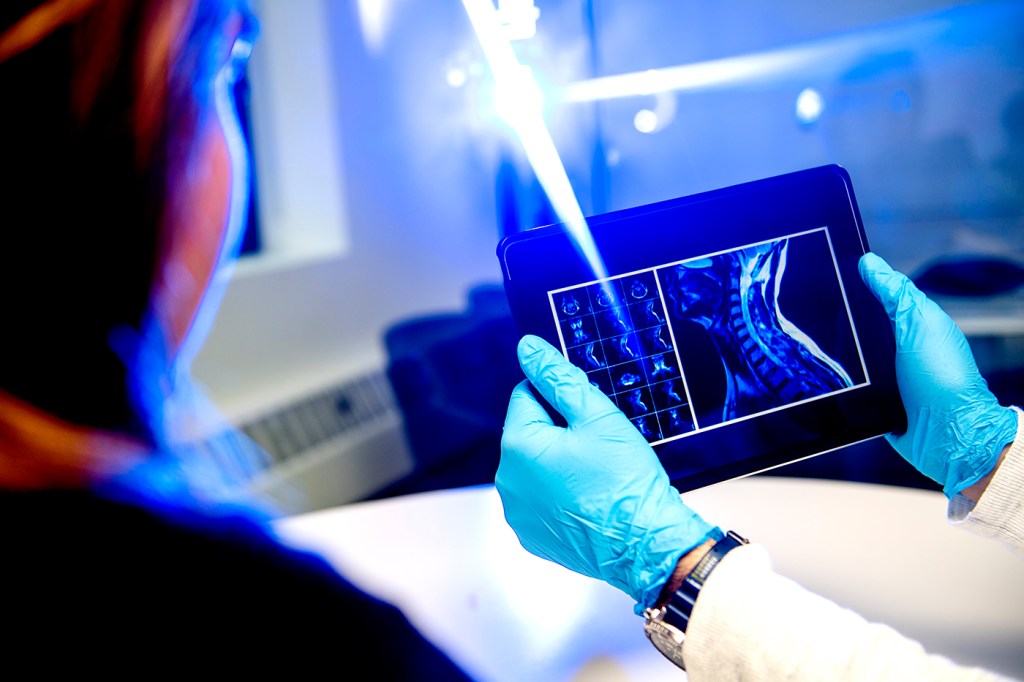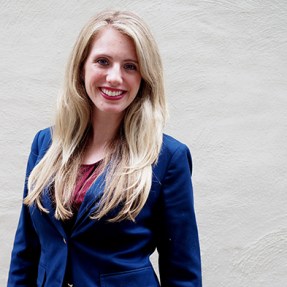Alumna’s company connects patients with clinical trials

One of the biggest obstacles in the development of new medical treatments—everything from essential medications to life-saving medical devices—is finding participants for clinical trials.
Nearly 80 percent of all clinical trials are significantly delayed—and more than 10 percent are cancelled altogether—because researchers can’t find enough participants, according to multiple studies. The stakes for the industry are high, given that it spends $5.9 billion on patient recruitment annually, according several international research groups including, Cognizant, CenterWatch, and the IBM Institute for Business Value Analysis.
But for patients, the stakes are even higher, according to Lilly Stairs, AMD’15, head of patient advocacy at Clara Health, a startup dedicated to helping patients find the right clinical trials.
For those who are not responding to treatment, their health, and in some cases their survival, depends on the development of new medications.
Part of the problem is that pharmaceutical companies rely heavily on physicians to recruit patients for clinical trials. While this makes sense, it’s not enough, according to Stairs.
“Right now, the entire system is physician-focused,” says Stairs. “We want to make it more patient-focused. We want to democratize the process.”
Clara Health has set out to address three of the biggest obstacles to patient recruitment.
Working with Clara Health was a godsend. It was like the sky opened up for us.
Brooke Abbott, Mother of a severely ill child
First, the primary clearinghouse for information, clinicaltrials.gov, is extremely difficult to use. It’s difficult to search, heavy on medical jargon, and slow to respond to patient inquiries. To make it easier for patients to find the right study, Clara Health has positioned itself as the “Google of clinical trials” by creating a patient-friendly website that includes all the information available on the government website in a format that’s easy to search and understand.
“Working with Clara Health was a godsend,” says Brooke Abbott, whose son suffers from severe asthma. “It was like the sky opened up for us.”
Abbott’s son, who is a child actor, lost his health insurance through the Screen Actors Guild when he had to turn down a role in the upcoming Disney movie A Wrinkle in Time. His medicine wasn’t working, he missed dozens of days from school in two months, and his doctor couldn’t find a clinical trial that would accept an 8-year-old.
That’s when Abbott turned to Clara Health, which she knew about through her work as a patient advocate. Within minutes of going on the Clara website, she saw a clinical trial in California focused on kids from 6 to 12 years old.
“I signed him up and called Lilly and she assigned me to a co-worker who arranged all the screening,” says Abbot.
This is the second critical service the company provides. Even for patients persistent enough to find the right trial, qualifying can be a nightmare.
“Enrolling in a clinical study is not an easy process,” says Stephen Amato, head of Northeastern’s master’s program in Regulatory Affairs for Drugs, Biologics, and Medical Devices. “It’s a heavily regulated industry and patients have to meet a lot of strict criteria. There’s lots of medical jargon involved, so having someone assist patients is an important service.”
This is exactly what Clara Health does, assigning a staff member to each patient to help them navigate the overwhelming paperwork required to qualify.
“We hold the patient’s hand throughout the entire process,” says Stairs.
Finally, many people are reluctant to participate in clinical trials because they’re worried about safety. This is one of the many reasons Stairs founded the company’s award-winning public education program, which in its first year has signed up more than 100 patients and treatment providers to address the myths surrounding clinical trials. Last month, her Breakthrough Crew won the patient engagement award at the annual Summit for Clinical Ops Executives.
“People say they don’t want to be a guinea pig,” says Stairs. “What they don’t realize is that many people who participate in trials say it’s the best care they’ve ever had because they’re watched so closely. What many people don’t realize is that clinical trials are highly regulated to ensure patient safety.”
Personal motivation
When Stairs was a freshman at Northeastern in 2010, she was incapacitated by a one-two punch of Crohn’s disease and psoriatic arthritis. In addition to bleeding intestines, she was crippled by such severe arthritis throughout her body that she could barely move.
“My mother had to dress and feed me,” she recalls.
Finding the right medicine to treat her symptoms took nearly two years. Her condition is currently under control, but that isn’t likely to last without the development of new medicines.

“The most common treatments for autoimmune disease are biologic treatments, which people tend to develop a resistance to,” says Stairs. “So there is a constant need for new treatments.”
As a communications major, healthcare wasn’t on her radar as a career path until one of her professors, Greg Goodale, suggested that she look for a co-op in the biotech industry. She landed a position at the Massachusetts Biotechnology Council, which later hired her to a full-time job after graduation.
Two years later, she joined Clara Health to help the tech-minded co-founders maintain the company’s “laser focus” on the needs of patients.
“Because of the brave patients who took part in clinical trials, the medication that has controlled my symptoms for four years was approved by the FDA,” she says. “Working for Clara gives me an opportunity to pay it forward.”
Why the patient’s perspective is essential
Stairs believes that the key to improving clinical trials lies in becoming more patient-centric.
“Healthcare needs to learn a lesson from Airbnb,” she says. “When the company was on the brink of failure, the founder went to New York City to knock on doors of every one of its hosts. Only by getting deep into users’ experiences were they able to understand and adapt. This’s what set Airbnb on the path to greatness.”
Healthcare needs to learn a lesson from Airbnb.
Lilly Stairs AMD’15
Stairs says healthcare has been slow adapt this customer focus. “How can companies expect to develop a useful tool for patients and caregivers if they aren’t regularly consulting them to build a product designed for their use?”
Clara Health offers its services free to patients and is building its business model with pharmaceutical and biotech companies as paying clients. Since these companies already spend nearly $6 billion annually on patient recruitment and retention—with unsatisfactory results—there’s a good reason for them to partner with patient advocacy groups to help serve as matchmakers.
In addition to winning a 30 Under 30 award from Forbes, the company has been backed by some of Silicon Valley’s top investors, including Khosla Ventures, Eventbrite founder Kevin Hartz, former Google exec Adrian Aoun, and billionaire Nicolas Berggruen.
Clara Health will initially focus on autoimmune disorders. But its website will connect patients with any study listed the government website.
“The opportunity is certainly there,” says Abbott. “But there’s also a lot of competition. So you have to be really good at what you do to launch a business in this area. That said, autoimmune disease is a good space to be in, because there’s a need. They’ve clearly done their homework.”





